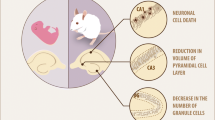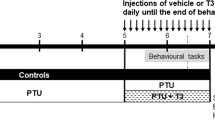Abstract
Purpose
Thyroid hormones (TH) are important for brain development and central nervous system (CNS) function. Disturbances of thyroid function occur with higher prevalence in the ageing population and may negatively impact brain function.
Methods
We investigated the age impact on behavior in young adult and old male mice (5 vs. 20 months) with chronic hypo- or hyper-thyroidism as well as in sham-treated controls. Expression of TH transporters and TH responsive genes was studied in CNS and pituitary by in situ hybridization and qRT-PCR, whereas TH serum concentrations were determined by immunoassay.
Results
Serum TH levels were lower in old compared with young hyperthyroid mice, suggesting a milder hyperthyroid phenotype in the aged group. Likewise, elevated plus maze activity was reduced in old hyperthyroid animals. Under hypothyroid conditions, thyroxine serum concentrations did not differ in young and old mice. Both groups showed a comparable decline in activity and elevated anxiety levels. However, an attenuated increase in hypothalamic thyrotropin releasing hormone and pituitary thyroid stimulating hormone transcript expression was found in old hypothyroid mice. Brain expression of monocarboxylate transporter 8 and organic anion transporting polypeptide 1c1 was not affected by age or TH status.
Conclusions
In summary, ageing attenuates neurological phenotypes in hyperthyroid but not hypothyroid mice, which fits with age effects on TH serum levels in the animals. In contrast no changes in TH transporter expression were found in aged mouse brains with hyper- or hypo-thyroid state.






Similar content being viewed by others
References
J. Bernal, A. Guadano-Ferraz, B. Morte, Perspectives in the study of thyroid hormone action on brain development and function. Thyroid 13(11), 1005–1012 (2003). https://doi.org/10.1089/105072503770867174
M. Ritchie, B.B. Yeap, Thyroid hormone: influences on mood and cognition in adults. Maturitas 81(2), 266–275 (2015). https://doi.org/10.1016/j.maturitas.2015.03.016
F.L. Yudiarto, L. Muliadi, D. Moeljanto, B. Hartono, Neuropsychological findings in hyperthyroid patients. Acta Med. Indones. 38(1), 6–10 (2006)
J.M. Guimaraes, deSouza Lopes, C. Baima, J. Sichieri, R. Depression, symptoms and hypothyroidism in a population-based study of middle-aged Brazilian women. J. Affect. Disord. 117(1-2), 120–123 (2009). https://doi.org/10.1016/j.jad.2008.12.012
S. Gulseren, L. Gulseren, Z. Hekimsoy, P. Cetinay, C. Ozen, B. Tokatlioglu, Depression, anxiety, health-related quality of life, and disability in patients with overt and subclinical thyroid dysfunction. Arch. Med. Res. 37(1), 133–139 (2006). https://doi.org/10.1016/j.arcmed.2005.05.008
J.D. Davis, R.A. Stern, L.A. Flashman, Cognitive and neuropsychiatric aspects of subclinical hypothyroidism: significance in the elderly. Curr. Psychiatry Rep. 5(5), 384–390 (2003)
M.F. Schreckenberger, U.T. Egle, S. Drecker, H.G. Buchholz, M.M. Weber, P. Bartenstein, G.J. Kahaly, Positron emission tomography reveals correlations between brain metabolism and mood changes in hyperthyroidism. J. Clin. Endocrinol. Metab. 91(12), 4786–4791 (2006). https://doi.org/10.1210/jc.2006-0573
W. Zhang, X. Liu, Y. Zhang, L. Song, J. Hou, B. Chen, M. He, P. Cai, H. Lii, Disrupted functional connectivity of the hippocampus in patients with hyperthyroidism: evidence from resting-state fMRI. Eur. J. Radiol. 83(10), 1907–1913 (2014). https://doi.org/10.1016/j.ejrad.2014.07.003
A. Gobel, M. Heldmann, M. Gottlich, A.L. Dirk, G. Brabant, T.F. Munte, Effect of mild thyrotoxicosis on performance and brain activations in a working memory task. PLoS ONE 11(8), e0161552 (2016). https://doi.org/10.1371/journal.pone.0161552
A. Gobel, M. Heldmann, A. Sartorius, M. Gottlich, A.L. Dirk, G. Brabant, T.F. Munte, Mild thyrotoxicosis leads to brain perfusion changes: an arterial spin labelling study. J. Neuroendocrinol. 29(1), (2017). https://doi.org/10.1111/jne.12446
S. Mayerl, J. Muller, R. Bauer, S. Richert, C.M. Kassmann, V.M. Darras, K. Buder, A. Boelen, T.J. Visser, H. Heuer, Transporters MCT8 and OATP1C1 maintain murine brain thyroid hormone homeostasis. J. Clin. Investig. 124(5), 1987–1999 (2014). https://doi.org/10.1172/JCI70324
S. Barez-Lopez, D. Bosch-Garcia, D. Gomez-Andres, I. Pulido-Valdeolivas, A. Montero-Pedrazuela, M.J. Obregon, A. Guadano-Ferraz, Abnormal motor phenotype at adult stages in mice lacking type 2 deiodinase. PLoS ONE 9(8), e103857 (2014). https://doi.org/10.1371/journal.pone.0103857
S. Barez-Lopez, A. Montero-Pedrazuela, D. Bosch-Garcia, C. Venero, A. Guadano-Ferraz, Increased anxiety and fear memory in adult mice lacking type 2 deiodinase. Psychoneuroendocrinology 84, 51–60 (2017). https://doi.org/10.1016/j.psyneuen.2017.06.013
J.P. Stohn, M.E. Martinez, A. Hernandez, Decreased anxiety- and depression-like behaviors and hyperactivity in a type 3 deiodinase-deficient mouse showing brain thyrotoxicosis and peripheral hypothyroidism. Psychoneuroendocrinology 74, 46–56 (2016). https://doi.org/10.1016/j.psyneuen.2016.08.021
C. Venero, A. Guadano-Ferraz, A.I. Herrero, K. Nordstrom, J. Manzano, G.M. de Escobar, J. Bernal, B. Vennstrom, Anxiety, memory impairment, and locomotor dysfunction caused by a mutant thyroid hormone receptor alpha1 can be ameliorated by T3 treatment. Genes Dev. 19(18), 2152–2163 (2005). https://doi.org/10.1101/gad.346105
S. Richard, N. Aguilera, M. Thevenet, O. Dkhissi-Benyahya, F. Flamant, Neuronal expression of a thyroid hormone receptor alpha mutation alters mouse behaviour. Behav. Brain Res. 321, 18–27 (2017). https://doi.org/10.1016/j.bbr.2016.12.025
K. Engels, H. Rakov, D. Zwanziger, G.S. Hones, M. Rehders, K. Brix, J. Kohrle, L.C. Moller, D. Fuhrer, Efficacy of protocols for induction of chronic hyperthyroidism in male and female mice. Endocrine 54(1), 47–54 (2016). https://doi.org/10.1007/s12020-016-1020-8
H. Heuer, M.K. Schafer, D. O’Donnell, P. Walker, K. Bauer, Expression of thyrotropin-releasing hormone receptor 2 (TRH-R2) in the central nervous system of rats. J. Comp. Neurol. 428(2), 319–336 (2000)
H. Heuer, M.K. Maier, S. Iden, J. Mittag, E.C. Friesema, T.J. Visser, K. Bauer, The monocarboxylate transporter 8 linked to human psychomotor retardation is highly expressed in thyroid hormone-sensitive neuron populations. Endocrinology 146(4), 1701–1706 (2005). https://doi.org/10.1210/en.2004-1179
J. Muller, H. Heuer, Expression pattern of thyroid hormone transporters in the postnatal mouse brain. Front Endocrinol. 5, 92 (2014). https://doi.org/10.3389/fendo.2014.00092
G.B. Potter, J.M. Zarach, J.M. Sisk, C.C. Thompson, The thyroid hormone-regulated corepressor hairless associates with histone deacetylases in neonatal rat brain. Mol. Endocrinol. 16(11), 2547–2560 (2002). https://doi.org/10.1210/me.2002-0115
D. Spano, I. Branchi, A. Rosica, M.T. Pirro, A. Riccio, P. Mithbaokar, A. Affuso, C. Arra, P. Campolongo, D. Terracciano, V. Macchia, J. Bernal, E. Alleva, R. Di Lauro, Rhes is involved in striatal function. Mol. Cell Biol. 24(13), 5788–5796 (2004). https://doi.org/10.1128/MCB.24.13.5788-5796.2004
P. Gil-Ibanez, J. Bernal, B. Morte, Thyroid hormone regulation of gene expression in primary cerebrocortical cells: role of thyroid hormone receptor subtypes and interactions with retinoic acid and glucocorticoids. PLoS ONE 9(3), e91692 (2014). https://doi.org/10.1371/journal.pone.0091692
A. Buras, L. Battle, E. Landers, T. Nguyen, N. Vasudevan, Thyroid hormones regulate anxiety in the male mouse. Horm. Behav. 65(2), 88–96 (2014). https://doi.org/10.1016/j.yhbeh.2013.11.008
C.G. Vasilopoulou, C. Constantinou, D. Giannakopoulou, P. Giompres, M. Margarity, Effect of adult onset hypothyroidism on behavioral parameters and acetylcholinesterase isoforms activity in specific brain regions of male mice. Physiol. Behav. 164(Pt A), 284–291 (2016). https://doi.org/10.1016/j.physbeh.2016.06.016
K. Wallis, M. Sjogren, M. van Hogerlinden, G. Silberberg, A. Fisahn, K. Nordstrom, L. Larsson, H. Westerblad, G. de Escobar Morreale, O. Shupliakov, B. Vennstrom, Locomotor deficiencies and aberrant development of subtype-specific GABAergic interneurons caused by an unliganded thyroid hormone receptor alpha1. J. Neurosci. 28(8), 1904–1915 (2008). https://doi.org/10.1523/JNEUROSCI.5163-07.2008
C. Johansson, P.K. Lunde, S. Gothe, J. Lannergren, H. Westerblad, Isometric force and endurance in skeletal muscle of mice devoid of all known thyroid hormone receptors. J. Physiol. 547(Pt 3), 789–796 (2003). https://doi.org/10.1113/jphysiol.2002.032086
Z. Soffe, H.G. Radley-Crabb, C. McMahon, M.D. Grounds, T. Shavlakadze, Effects of loaded voluntary wheel exercise on performance and muscle hypertrophy in young and old male C57Bl/6J mice. Scand. J. Med Sci. Sports 26(2), 172–188 (2016). https://doi.org/10.1111/sms.12416
S.R. Raymaekers, V.M. Darras, Thyroid hormones and learning-associated neuroplasticity. Gen. Comp. Endocrinol. 247, 26–33 (2017). https://doi.org/10.1016/j.ygcen.2017.04.001
Acknowledgements
The authors are grateful to A. Jaeger, S. Rehn, M. Schmidt for their dedicated technical support.
Funding
This work was supported by DFG FU356/7–1/2 to DF, MO1018/2–1/2 to LCM, and HE3418/8–1 to HH in the framework of SPP1629 and RTG1715 to HH/FK. Funding source was not involved in decisions about study design; collection, analysis and interpretation of data; in the writing of the report; and in the decision to submit the article for publication.
Author information
Authors and Affiliations
Corresponding author
Ethics declarations
Conflict of interest
The authors declare that they have no conflict of interest.
Ethical approval
All animal experiments were performed in accordance with the German regulations for Laboratory Animal Science (GVSOLAS) and the European Health Law of the Federation of Laboratory Animal Science Associations (FELASA). The protocols for animal studies were approved by the Landesamt für Natur, Umwelt und Verbraucherschutz Nordrhein-Westfalen (LANUV-NRW), Germany (AZ.84–02.04.2013.A188).
Additional information
Publisher’s note Springer Nature remains neutral with regard to jurisdictional claims in published maps and institutional affiliations.
Supplementary information
Rights and permissions
About this article
Cite this article
Kerp, H., Engels, K., Kramer, F. et al. Age effect on thyroid hormone brain response in male mice. Endocrine 66, 596–606 (2019). https://doi.org/10.1007/s12020-019-02078-6
Received:
Accepted:
Published:
Issue Date:
DOI: https://doi.org/10.1007/s12020-019-02078-6




